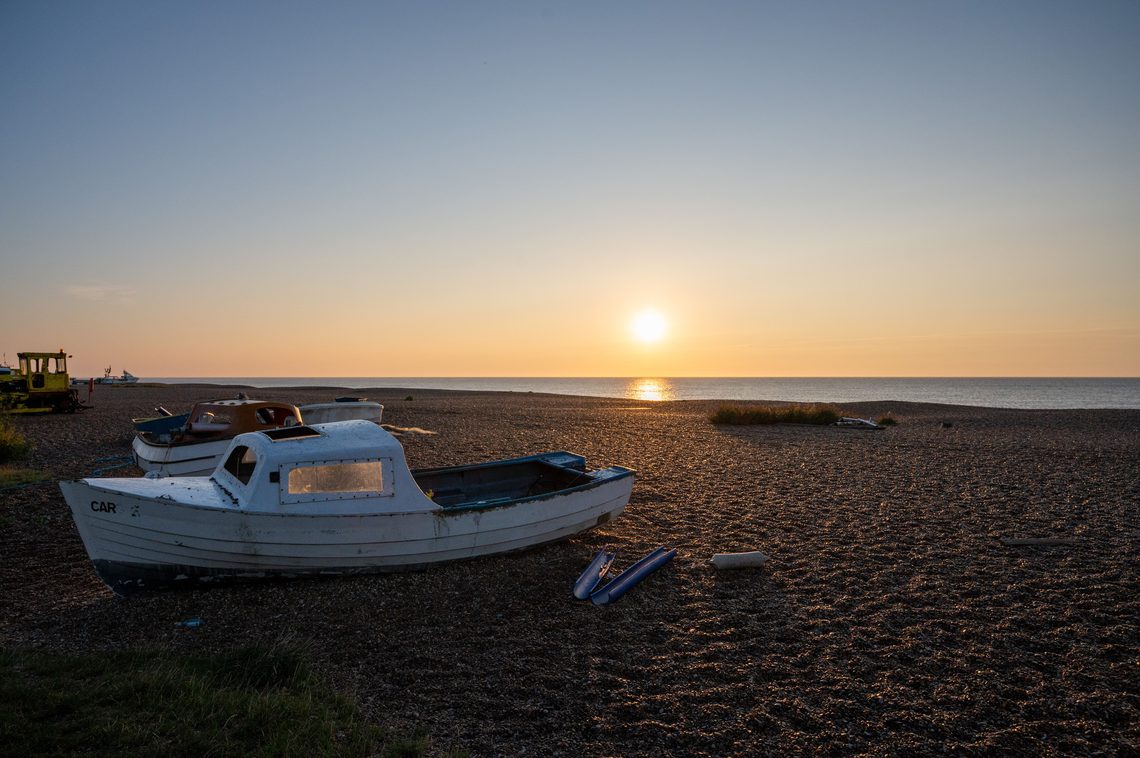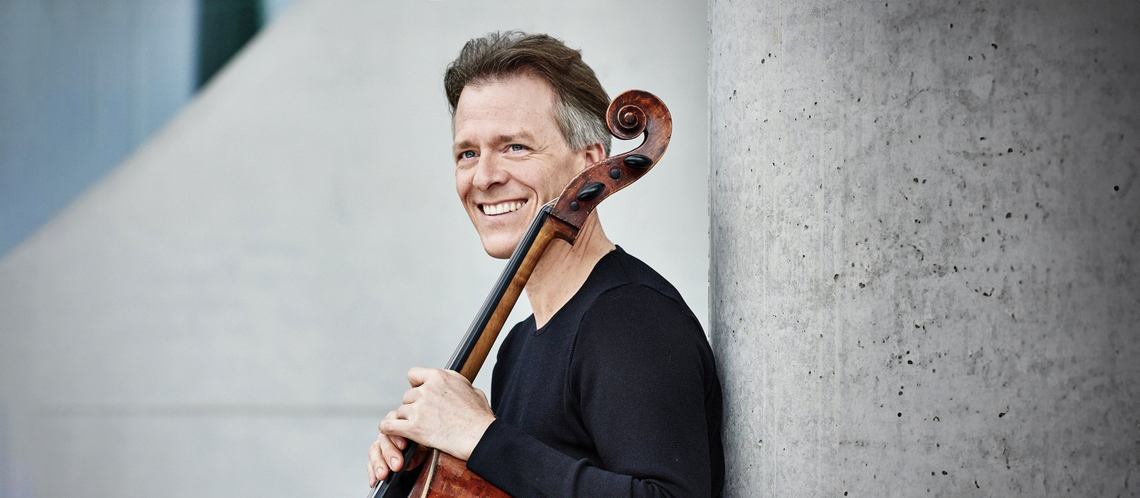On a rather grey day in February, looking out across the reedbeds at Snape Maltings, we chatted with cellist, Alban Gerhardt, to get to know more about one of the 75th Aldeburgh Festival’s featured musicians.
Gerhardt has, for 25 years, made a unique impact on audiences worldwide with his intense musicality, compelling stage presence and insatiable artistic curiosity. His gift for shedding fresh light on familiar scores, and his appetite for investigating new repertoire from centuries past and present, truly set him apart from his peers.
Alongside an extensive repertoire comprising all the core concertos, Gerhardt is also first choice of soloist for many contemporary composers, including Julian Anderson and Brett Dean. His recording of Unsuk Chin’s Cello Concerto – a work written specially for him – won a BBC Music Magazine Award and was shortlisted for a Gramophone Award in 2015. Also a keen chamber musician, Gerhardt regularly works with artists across all disciplines.
So, here’s what we found out from one of the world’s most versatile cellists.
Tell us about your history with Snape Maltings and Aldeburgh.
I came to Aldeburgh maybe 25 years ago and it was magical. Of course, I knew about Britten, but putting a place to the name really made me understand Britten’s music in a new way. I have many beautiful memories with family and friends here. The pebble beaches for one provide a captivating image and the landscape is truly inspirational.
My favourite LP when I was growing up was Britten and Rostropovich’s Sonata for cello and piano, which I will be playing on Friday 14 June. It combined my favourite cellist, Rostropovich, with the most amazing composer of the 20th century. To be able to play such an influential work of my childhood in a setting so intertwined with Britten, feels special.
You originally learnt the piano and the cello. What made you choose one over the other?
I started learning the piano when I was three and for many years, perhaps until I was 17, I was a significantly better pianist than a cellist. With the piano, I felt I could play 80% of the piano perfectly, however, I couldn’t overcome that final 20%, which truly defines an exceptional pianist. It was at that point when I decided to dedicate my time to the cello.
I began the cello at eight years old, and I found it much easier to find my voice with it. I have the unique ability to recognise my own cello playing when listening to recorded music, which many cellists find very difficult to do. My own mother can always recognise my playing. The cello felt like the most natural expression of my voice, and that’s why I decided to stick with it.

Aldeburgh beach
Tell us about your cello
I play a Matteo Gofriller cello, and it is a particularly large cello, compared to the much smaller cellos often played today. Charles Beare, a leading expert, or in my eyes, the god of string instruments, studied what is now my cello, and claimed it is the only cello by this maker which has not been reduced in size. The result is a very distinctive ‘cello-like’ sound. What I mean by this is when reduced in size, cellos can often begin to take on the tones of violins, whereas due to its size, this particular cello has kept that distinction. Originally, cellos were instruments to be played in a church. However, as they began to be used for more concert performances and recitals, and therefore an alternate repertoire to that played in the church, they were made smaller to meet the demands of new pieces.
I have been playing this particular instrument since 2004 and it was a true odyssey sourcing it. The cello is around 300 years old and is said (although there is no evidence of this) to have been owned by Benito Mussolini, who apparently was a keen collector of stringed instruments, before being gifted to the poet Gabriele D’Annunzio. Following a series of events including a world war, it ended up in the basement of a gallerist in Hamburg, who was found by a violin dealer in London – quite a story. It is, however, the only cello I have ever owned, and it is actually in very bad condition, covered in cracks and all sorts. Whilst I have had it fixed for its acoustics many times, I have never had its aesthetic changed to make it look perfect, on the recommendation that this would ultimately affect the sound.
What has been a highlight of your career so far?
I don’t have one particular highlight of my career, but there is one place and one orchestra which are very special to me. I grew up in the Berliner Philharmoniker. My father was the second violinist for 35 years, and when I was four years old, he would sit me on the choir benches and let me listen to the orchestra. Now, nearly 50 years later, it is always a highlight to play at the Berliner Philharmoniker and with the orchestra. A particularly special time was playing with my father a final time before his retirement, in 2007.
In addition to my career highlights as a musician, I also have some favourite memories of particular events which I really enjoyed. An important part of my career is engaging with those who support the arts. For three consecutive years, I had a residency in Portland, Oregon. The most meaningful thing I did as part of this residency was work with a juvenile centre which cared for vulnerable boys, where I could positively impact them directly through music. This was wonderful to experience.
One of the most enjoyable events I have attended was the opening of a cultural centre which was sponsored by a prominent vineyard owner. The event itself was wonderful, but the real benefit I felt, was to connect with all these fascinating people around me who supported and were invested in the arts. I feel it is my duty as an artist to reach out to communities and donors, as a way of thanking them for their generosity. Their support is a unique form of philanthropy, not for the benefit of the individual, but for the greater benefit of the arts.

Alban Gerhardt
Credit: Kaupo KikkasWho are you looking forward to seeing most at The Aldeburgh Festival?
Unsuk Chin is one of the greatest living composers, and certainly in the top 5 composers of the last 50 years for me, particularly for her unique voice and how it expresses itself wihtin her works. Some composers aim for easy listening, or to be so experimentative that everything they create is to test the listeners. This is not Unsuk.
Following the Second World War, a German philosopher, Theodor Adorno, said something along the lines of ‘there cannot be beauty in music’, in other words, music should be challenging and difficult. Many German composers have continued to follow this line of thinking when creating modern music and I think this is wrong. Unsuk, as well as other composers such as Brett Dean, do not abide by this form of modern music, they instead draw out the true beauty of music.
It took me a very long time to get Unsuk to compose a piece for me. For years, I went to her parties with my cello, in the hope she would one day agree to write a cello concerto, and eventually she said yes! A cello concerto is an extremely complex piece of music to write and it took Unsuk three years, and I waited to premiere the piece at the Proms. It took me 100 hours to memorise the piece and another 100 hours to learn to play it.
I very much look forward to seeing and hearing more from Unsuk during the Festival.
Who would you like to work with in the future?
There are three to four composers I’m particularly keen to work with (or work with again). These include Thomas Adès, Brett Dean, Unsuk Chin, and Augusta Read. Thomas Adès is particularly interesting. I find there are many parallels between himself and Britten, as a composer, pianist and conductor and he makes truly beautiful music.
Ideally, I would like to have a cello concerto composed every five years. More importantly, I would like to play more repeated pieces. I find works are often premiered just once in different places around the world, and then put back on the shelf. I would like to play more pieces multiple times in the same location over a period of time, to really consolidate the music. This is what I hope to achieve in the future of my career.
